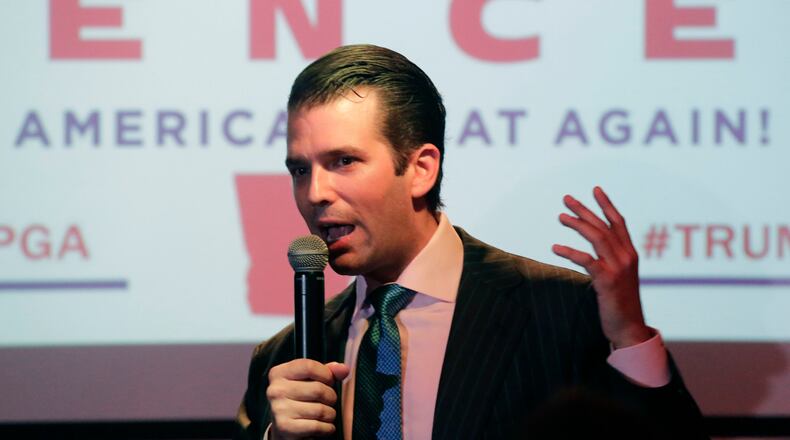PolitiFact last week looked at statements about whether collusion is a crime, health insurance and Medicaid in particular. Here are abbreviated versions of our fact checks. Full versions can be found at www.politifact.com.
“Collusion is not illegal.”
— Eric Bolling on Tuesday, July 11, 2017, in comments on “Fox News Specialists”
Bolling’s statement came after Donald Trump Jr. defended himself for meeting with a Russian lawyer in hopes of receiving damaging information on Hillary Clinton during the 2016 presidential race.
Legal scholars told us that the word “collusion” may not appear in statutes, but the actions involved in working with Russian officials could still violate criminal law.
The possible crimes they suggested included allowing a foreign national to use something of value to influence a federal election and conspiracy.
Our ruling
Bolling said “collusion is not illegal.”
Legal scholars told us the word “collusion” may not be specifically used in legal language. But conduct that may be described as collusion could potentially be subject to multiple federal laws.
We rate Bolling’s statement Mostly False.
7 million people the Congressional Budget Office says won’t have health insurance coverage under the Senate health care bill “don’t exist.”
— White House Legislative Affairs Director Marc Short on Sunday, July 2nd, 2017, in an episode of “Fox News Sunday”
Short’s claim is a variation on a recent Republican talking point: The Congressional Budget Office report did not use its most recent baseline estimates when scoring the Senate health care bill. (The “baseline” is what CBO predicts will happen if current law remains unchanged.) So the 22-million drop in coverage is based on out-of-date data, Republicans say.
We found that he has a point. By picking one baseline over another — which it did after consulting with congressional budget committees — the CBO may have altered an estimate of the people who would no longer be covered by health insurance. But Short’s specific figure and his description are imperfect.
It wouldn’t necessarily be 7 million fewer, as Short implied. It’s a mistake to equate projections for marketplace coverage under current law with the potential impact of the Senate health care bill on that enrollment, experts told us.
Experts also called Short’s claim misleading because even if the CBO used the newer baseline, insurance coverage would still drop by many millions. It also ignores the fact that the majority of coverage loss under the Senate bill would be due to changes in Medicaid, the government health insurance program for poor Americans that Obamacare expanded.
Our ruling
It is plausible that the CBO overestimated the drop in health care coverage under the Senate proposed replacement for Obamacare because it based its estimates on data from 2016 rather than 2017. But to say the projection was off by 7 million is an oversimplification.
We rate Short’s statement Half True.
Medicaid “is contributing to 70 percent of our budget deficit right now. It’s the one that is in our lap because of Obamacare.”
— Pat Toomey on Monday, July 10th, 2017, on “Morning Joe”
The U.S. senator from Pennsylvania defended the Senate health care bill’s curbing of Medicaid spending by calling Medicaid the single-biggest driver of the federal budget deficit.
Toomey’s office pointed out that spending on Medicaid is equal to 70 percent of the deficit. It divided projections on Medicaid spending in 2017 ($389 billion) by the estimated budget deficit ($559 billions) to get 69.6 percent.
The problem is, that same calculation can be made with any federal program to reach a different conclusion. Defense spending, for example, would account for 113 percent of the deficit.
As for Obamacare’s impact on the deficit through the Medicaid expansion, elderly people and those with disabilities account for two-thirds of the program’s spending, and low-income children account for one-fifth. Those two groups were unaffected by the expansion. Plus, the increased coverage through the expansion was covered by taxes imposed by the Affordable Care Act so as not to grow the deficit.
Our rating
Toomey said Medicaid is contributing to 70 percent of our budget deficit.
The truth is, Medicaid spending annually is about 70 percent of the size of the federal budget deficit. The same logic, if applied to defense spending, would mean defense spending contributes more than 100 percent to the deficit. Experts say both comparisons are flawed and misleading.
Blaming the Affordable Care Act for the rise in Medicaid spending isn’t entirely right either, as the majority of Medicaid spending was already in place before the law, and taxes were imposed to offset the Medicaid expansion’s strain on the deficit.
Toomey’s claim contains an element of truth but ignores critical facts that would give a different impression.
We rate this statement Mostly False.
About the Author
Keep Reading
The Latest
Featured



